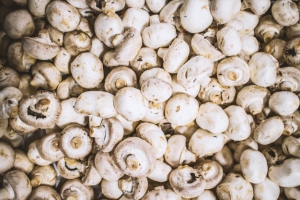A study from Singapore shows that people who eat more than two portions of mushrooms per week have a 47% lower risk of developing Mild Cognitive Impairment (MCI).
What is MCI?
MCI is a condition in which memory, concentration, or other cognitive functions are slightly below what is normal for one’s age, while daily functioning remains largely intact. It is considered an early warning sign of dementia, though not every case of MCI progresses to it.
How mushrooms help
Scientists believe that certain compounds in mushrooms, such as antioxidants and bioactive substances may help protect brain cells from oxidative stress.
Important to know
The study is observational: it shows associations, but not necessarily cause-and-effect.
Further research and clinical studies are needed to understand exactly which mushroom varieties and dosages are most effective.
Published by Mushroom Matter: Inspired by research published via PMC (National Library of Medicine)
Meet the Garden Giant
Today in the leading role the 'King Stropharia', commonly known as the wine cap mushroom. This mushroom gets its name from the rich wine-red color and knows its origin in North America. The King Stropharia reaches 20 cm high and has a reddish brown rounded to flattened cap that can become 30 cm wide, therefor the name 'Garden Giant' or 'Godzilla Mushroom'. The gills have initially a pale color, then become gray and finally dark purple-brown. The firm flesh is white, as is the high stem that bears a wrinkled ring. King Stropharias have a delicious rich mushroomy flavor with undertones of potatoes and red wine and the stem has an asparagus-like texture. These delicious mushrooms are extremely low in sodium and calories, as well as fat and cholesterol free. They also contain iron, protein and calcium, making them a healthy addition to your meal.
Read all about this wonderful mushroom here.
The value of the global functional mushroom market
The global functional mushroom market was valued at USD 25,415.12 million in 2020, and it is estimated to register a CAGR of 8.44% during the forecast period 2021-2026.
Mushrooms that support immune health have benefited since the start of the COVID-19 pandemic, with high interest from food, beverage, and nutritional supplement manufacturers, which has carried over to the entire mushroom category.
There exists a high demand for safe and natural immune-supportive health products, including supplements featuring mushrooms that support immune health, such as chaga, reishi, shiitake, cordyceps, and turkey tail.
- Over the long term too, functional mushrooms are expected to find application in a wide variety of healthcare or pharmaceutical products, which has increases the applicability of mushrooms in the food and beverage sector. As products infused with mushroom ingredients are becoming a big part of the trend of self care, offering a recognizable source of delivery formats and impressive health benefits, the market demand is expected to continue to grow over the forecast period.
Please read the full article here.
Source: ReportLinker
The power of medicinal mushrooms
Mushrooms are delicious to eat, they contribute to our health, but did you know that there are a number of species that have a medicinal effect?
Medicinal mushrooms contain polysaccharides, glucans and many minerals and B vitamins. These can make an important contribution to the treatment of many diseases and conditions. This includes chronic conditions, autoimmune diseases, cancer, skin conditions and allergies. Many studies have now proven the medicinal effect of these types of mushrooms.
Some examples of medicinal mushrooms are: Chaga, Lion's Mane, Cordyceps, Reishi, Shiitake and Maitake. Medicinal mushrooms do not cause a change in consciousness. So it doesn't get you high or stoned. Scientific studies have shown that the risk of side effects is also small. So it is safe to use these types of supplements. But if you are taking other medications? Always do this in consultation with a specialist.
In Asian countries, such as China, Japan and Korea, the use of medicinal mushrooms is one of the normal therapeutic treatments. And now medicinal mushrooms are also increasingly used in other countries of the world to fight diseases.
Reviewed by Emily Henderson, B.Sc.
Researchers have identified another good reason to eat more mushrooms. New research , published in Food Science & Nutrition (January 2021) found that adding a mushroom serving to the diet increased the intake of several micronutrients, including shortfall nutrients such as vitamin D, without any increase in calories, sodium or fat.
Dr. Victor L. Fulgoni III and Dr. Sanjiv Agarwal modeled the addition of mushrooms to National Health and Nutrition Examination Survey (NHANES) 20112016 dietary data looking at a composite of white, crimini and portabella mushrooms at a 1:1:1 ratio; one scenario including UVlight exposed mushrooms; and one scenario including oyster mushrooms for both 918 years and 19+ years of age based on an 84g or ½ cup equivalent serving.
Key findings include:
- Adding an 84g serving of mushrooms increased several shortfall nutrients including potassium and fiber. This was true for the white, crimini and portabella 1:1:1 mix and the oyster mushrooms.
- The addition of a serving (84 g) of mushrooms to the diet resulted in an increase in dietary fiber (5%6%), copper (24%32%), phosphorus (6%), potassium (12%14%), selenium (13%14%), zinc (5%6%),
riboflavin (13%15%), niacin (13%14%), and choline (5%6%) in both adolescents and adults; but had no impact on calories, carbohydrate, fat or sodium. - When commonly consumed mushrooms are exposed to UVlight to provide 5 mcg vitamin D per serving, vitamin D intake could meet and slightly exceed the recommended daily value (98% 104%) for both the 9 18 year and 19+ year groups as well as decrease inadequacy of this shortfall nutrient in the population.
- A serving of UVlight exposed commonly consumed mushrooms decreased population inadequacy for vitamin D from 95.3% to 52.8% for age group 918 years and from 94.9% to 63.6% for age group 19+ years.
"This research validated what we already knew that adding mushrooms to your plate is an effective way to reach the dietary goals identified by the DGA. Data from surveys such as NHANES are used to assess nutritional status and its association with health promotion and disease prevention and assist with formulation of national standards and public health policy (CDC, 2020)."
Mary Jo Feeney, MS, RD, FADA, Nutrition Research Coordinator,
Mushroom Council
Mushrooms are fungi a member of the third food kingdom biologically distinct from plant and animalderived foods that comprise the USDA food patterns yet have a unique nutrient profile that provides nutrients common to both plant and animal foods.
Although classified into food grouping systems by their use as a vegetable, mushrooms' increasing use in main entrees in plantforward diets is growing, supporting consumers' efforts to follow foodbased dietary guidance recommendations to lower intake of calories, saturated fatty acids, and sodium while increasing intake of underconsumed nutrients including fiber, potassium and vitamin D. Often grouped with vegetables, mushrooms provide many of the nutrient attributes of produce, as well as attributes more commonly found in meat, beans or grains.
According to the USDA's FoodData Central, 5 medium raw, white mushrooms (90g) contain 20 calories, 0g fat, 3g protein and are very low in sodium (0mg/<1% recommended daily value). Few foods naturally contain vitamin D, and mushrooms are unique in that they are the only food in the produce aisle that contain vitamin D. Specifically, one serving of raw, UVexposed, white (90g) and crimini (80g) mushrooms contains 23.6mcg (118% RDA) and 25.52mcg (128% RDA) of vitamin D, respectively.
Mushrooms are one of the best dietary sources of sulfurcontaining antioxidant amino acid ergothioneine and tripeptide glutathione Ergothioneine and glutathione contents in mushrooms depends upon the mushroom varieties, and oyster mushrooms contain more amounts of these sulfur containing antioxidants than commonly consumed mushrooms: white button, crimini, or portabella mushrooms. The addition of a serving of commonly consumed mushrooms and oyster mushrooms would be expected to add 2.24 and 24.0 mg ergothioneine, respectively, and 3.53 and 12.3 mg glutathione, respectively, to the NHANES 20112016 diets based on published literature values.
At this time, the USDA FoodData Central database does not include analytical data on ergothioneine. However, the Mushroom Council is currently supporting research to analyze mushrooms for bioactives/ergothioneine for possible inclusion in USDA FoodData Central database.
More research from the mushroom council still to come
With mushrooms growing in awareness and consideration among consumers nationwide, in 2019, the Mushroom Council made a $1.5 million multiyear investment in research to help broaden understanding of the food's nutritional qualities and overall health benefits.
In addition to the analysis of mushrooms for bioactives/ergothioneine for inclusion in USDA FoodData Central database, additional research projects approved include:
- Health promoting effects of including mushrooms as part of a healthy eating pattern.
- Mushrooms' relationship with cognitive health in older adults. Mushrooms' impact on brain health in an animal model.
- Nutritional impact of adding a serving of mushrooms to USDA Food Patterns.
Since 2002, the Council has conducted research that supports greater mushroom demand by discovering nutrient and health benefits of mushrooms. Published results from these projects form the basis for communicating these benefits to consumers and health influencers.
Source: FLM Harvest Journal
Today in the leading role: the King oyster mushroom, also known as Eryngii. This mushroom grows on sawdust substrate to which mycelium is added. As soon as the King Oyster mushrooms start to grow, the bags are opened so that they can fully develop. When they are fully grown, the mushrooms are harvested by hand. The King oyster mushroom does very well in the kitchen. And because of its source of fiber, protein, vitamins and minerals, this mushroom is a healthy addition to any dish and also a great substitute for meat ♥
South Mill Champs expands mushrooms processing capabilities with the acquisition of The Mushroom Company
The Mushroom Company is one of North America's largest mushroom processors. Over the last 90 years it has built a reputation for high-quality, innovative products and superior dedicated customer service. The Mushroom Company's product capabilities range from individually quick-frozen (IQF) to canning, blanching, blending, and roasting mushrooms and other vegetables. It primarily serves the food service and industrial markets, where its mushrooms end up on pizzas, in soups, and on various quick and casual-service restaurant menus.
"We are excited to join the South Mill Champs family," said Dennis Newhard, President of The Mushroom Company. "Over the last few years, SMC has shown exceptional leadership in innovation and growth in the mushroom industry. We look forward to supporting and further expanding SMC's capabilities and product innovation. Our industry is experiencing strong growth as consumers continue to recognize the significant health and environmental benefits of mushrooms. We believe the future is bright and this combination gives us the resources to continue to be an industry leader."
Please read the full article here.
Source: South Mill Champs



























